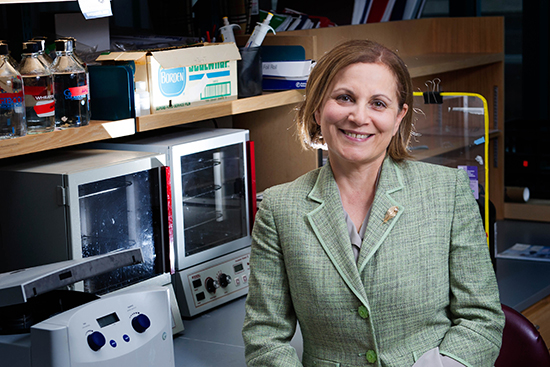A New Resource for Biomedical Research
MED’s Katya Ravid leads effort to spur interdisciplinary collaborations

As part of the University’s growing effort to foster the kind of collaborative, boundary-crossing science that leads to more discoveries and improves health, Gloria Waters, BU vice president and associate provost for research, has announced the establishment of the new University-wide Interdisciplinary Biomedical Research Office (IBRO), with Katya Ravid, a School of Medicine professor of medicine and biochemistry, as the director. The office will operate under the auspices of Waters and David Coleman, Wade Professor of Medicine and MED department of medicine chair.
“We are delighted to collaborate with the department of medicine on this initiative to further increase collaboration in the biomedical sciences across the Charles River and Medical Campuses,” says Waters.
As director of this new initiative, Ravid will work with administrators and faculty on both campuses—including with David Center (CAS’72, MED’72), director of the Clinical Translational Science Institute and associate provost for translational research—to spur interdisciplinary biomedical research in new areas. The initiative builds on the success of efforts such as the Evans Center for Interdisciplinary Research and the Clinical Translational Science Institute, says Ravid, founding director of the Evans Center.
“BU recognizes the importance of team science,” Ravid says. “By developing programs and activities to encourage biomedical team science at all levels—through this new office, the Evans Center, and in collaboration with the Clinical Translational Science Institute, as well as other initiatives—we maintain a competitive edge in advancing biomedical discoveries and securing grant funding.”
In the past five years, she says, the Evans Center has demonstrated the effectiveness of team science through its interdisciplinary research groups called Affinity Research Collaboratives (ARCs), which are supported by the department of medicine. Each ARC consists of at least five investigators from at least two different disciplines whose shared goal is to investigate biomedical problems concerning human disease. Prior to applying for an ARC, faculty are required to collectively explore a research theme over a period of time. The ARC structure was commended as a model for collaborative interdisciplinary research by researchers at the National Institutes of Health’s annual Science of Team Science conference in June 2015.
“We are poised now to expand this model to create opportunities for interdisciplinary biomedical research across the University, using primarily peer-reviewed investigators-initiated research themes,” says Ravid. “Our focus will remain on basic science discovery, while also considering the goal of the Clinical Translational Science Institute, which is to facilitate the translation of discoveries into clinical trials, and therapies.”
For more information, see the IBRO website, where faculty can also fill out a short survey to help make connections with potential collaborators.
Faculty and postdocs are invited to the Exploring Research & Funding Opportunities for Interdisciplinary Biomedical Research within BU event on Wednesday, May 4, from 3 to 5 p.m. at the Florence & Chafetz Hillel House, 213 Bay State Rd., fourth floor. It will be an opportunity to hear from faculty with successful affinity research collaborations and learn about funding opportunities from the Boston Biomedical Innovation Center, a consortium of academia, nonprofits, government, industry, and venture capitalists.
This BU Today story was written by Sara Rimer.
A version of this article originally appeared on BU Research.